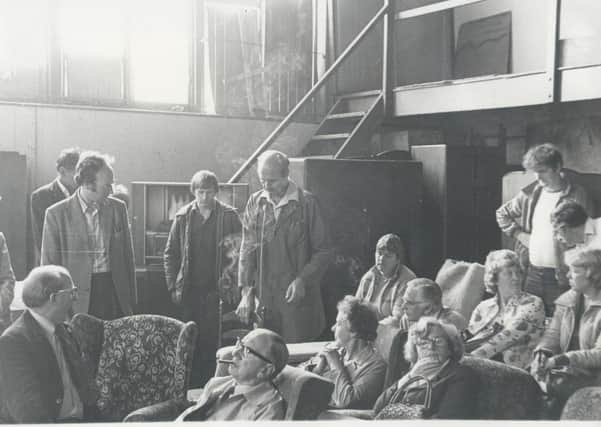The Nostalgia column with Margaret Watson: All fired up by ‘chumping’


Preparing for “Bonfire Night” was an exciting time for all the children up our street, which meant going out “chumping” every night after school.
Children today may have no idea what chumping means but people of my generation will never forget it.
Advertisement
Hide AdAdvertisement
Hide AdWe went out every night searching for fallen branches from gardens in the district and any wood we could find to ensure our bonfire was the biggest ever.


Going potato picking on local farms was another adventure we looked forward to during the cold, damp days of Autumn.
We went to a farm in Drighlington which was four miles from our home and cost us nearly as much in bus fares as we got for picking potatoes.
Why Drighlington I’ll never know, but my husband and his mates in Hanging Heaton had more sense and went to one in walking distance in Grange Road.
Advertisement
Hide AdAdvertisement
Hide AdNot having to spend money on bus fares gave them more money to give to their parents when they got home.
When Potato picking and Bonfire Night were over, there was always “carol singing” round the neighbourhood to look forward to.
We started weeks before Christmas but gave good value for money and never sang less than three carols at every door, finishing off with the obligatory “We Wish You a Merry Christmas”.
The first houses we visited were situated in Halifax Road, which was regarded as a “posh” area because those living there were pretty well off.
Advertisement
Hide AdAdvertisement
Hide AdThey lived in big houses and were a mix of mill owners, business people, doctors and lawyers, all from what we called the professional class.
A local vicar, writing in his parish magazine, once described them as the “Halifax Road Aristocrats” and admonished them for not doing enough to help those living in poor housing conditions nearby.
He was referring to families like ours living in overcrowded conditions which would later be called “slums”.
We lived within walking distance of their magnificent mansions, and although only a few hundred yards separated our two communities, in every other respect we were worlds apart.
Advertisement
Hide AdAdvertisement
Hide AdI am writing now of the early 1940s and 50s, a time when life was changing for the communities of which I am writing.
The community in which I lived was being broken up and people were being moved to council estates on the outskirts of town.
The middle classes too had already started moving away to live in places much further away from Dewsbury and the ever expanding council estates which were sprouting up all around them.
But I never forgot them because they had always been kind to us when we went carol singing and gave generously even though we visited them nearly every night in the run-up to Christmas.
Advertisement
Hide AdAdvertisement
Hide AdThey didn’t seem to mind our nightly visits because I believe they knew the money wasn’t for us but for our parents who needed every penny to cover the extra cost of Christmas.
Sometimes we were asked to go inside and sing a few carols, and I’ve never forgotten one house we went into which was flooded with light and so beautiful.
A huge chandelier hung from the hall ceiling, all lit by electricity, not gas mantles like those in our house which cast shadows everywhere.
Years later I was invited into this house again, but it was no longer a private residence, but a nursing home, for the elderly.
Advertisement
Hide AdAdvertisement
Hide AdThe chandelier had gone, as had the Axminster carpets and I wondered if they’d been auctioned off at one of the many local auction houses which once existed in Dewsbury.
House auctions regularly took place in various parts of the town when I was a child, often in the house being vacated or in the garden.
My mother went to many, but she could never afford to buy anything except perhaps a linen tablecloth or two for a few pennies.
These she placed in a large blanket boxes into which she put everything she was planning to take to our “new house” which the council kept promising we would get.
Advertisement
Hide AdAdvertisement
Hide AdAuctions were popular and people regularly went to them in search of bargains whether the auction was being held in private houses or auction rooms.
Auction rooms were meeting places for dealers as well as individuals who saw the value of investing in good second-hand goods.
I remember once interviewing George Stringer, whose father, Charlie, founded the “We Buy ‘Owt” emporium in Tithe Barn Street.
George took over from his dad, but what had once been a thriving businesses, eventually started going down as shopping trends changed.
Advertisement
Hide AdAdvertisement
Hide AdPeople had begun turning up their noses at anything second-hand, and sadly a lot of fine furniture, with plenty of years still left in it, found its way to the rubbish tip.
The auction rooms I remember were Dewsbury Auctions, White Rose Auctions, and we mustn’t forget Oscar Crowe’s auction rooms in Ravensthorpe.
The picture above shows the late George Stringer standing in the middle of an auction room off Daisy Hill, Dewsbury, which I think was either Dewsbury Auctions or White Rose Auctions, but not sure.